Geographic Indications and International Trade (GIANT)
|
TED Case Studies
Number 762, 2004
by Risa Ciccone

©1996-2004
AJINOMOTO CO.,INC. All rights reserved.
|
Pork-Enzyme

©1996-2004
AJINOMOTO CO.,INC. All rights reserved.
|
|
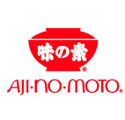
©1996-2004
AJINOMOTO CO.,INC. All rights reserved.
I. Identification
 1.
The Issue
1.
The Issue
In 2000, Indonesia moved quickly to contain
a scandal unleashed by the discovery that pork products were used in the
production of one of the country's most popular flavor enhancers; the
scandal involving the rich and powerful Japanese company and its very
popular product the AJINOMOTO. The product used a taste enhancer which
called Monosodium Glutamate (MSG) that is allegedly tainted with pork
enzymes. The news of the discovery caused massive protests in Jakarta
and other Indonesian cities. This popular taste enhancer had been recalled
and taken off the shelves across the country. Muslims do not consume pork
or any of its derivatives, as it is considered forbidden by Islamic law.
About 90% of Indonesia's 210 million people are Muslims who follow Islamic
dietary laws that prohibit the consumption of pork. |
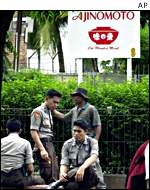 |
 2.
Description
2.
Description
|
1) What
is AJINOMOTO?
The original seasoning AJINOMOTO
was introduced into the market more than 90 years ago. In 1908, Professor
Kikunae Ikeda, who specialized
in physical science at the University
of Tokyo at the time, discovered the secret behind the great taste
of yudofu (bean curd boiled with kelp)
when he identified glutamic acid found in the "broth" made from
kombu (a type of seaweed) as
the source of this delicious taste. Professor Ikeda subsequently found
that glutamate had a distinctive taste different from that of sweet, sour,
bitter and salty, which he named "umami." Given his concern
for improving the nutritional balance of Japanese people, Professor Ikeda
had a strong desire to help improve Japanese people's physiques as well
as contribute to enriched dietary habits through the appetite-enhancing
“umami” taste of glutamic acid.
(1)
As a means of promoting the widespread
use of AJINOMOTO, public relations activities in the early days
of the Company included the adoption of a new logotype depicting a woman
wearing an apron, poster advertisements in commuter trains and newspaper
advertisements. Concurrent efforts were also directed toward establishing
a domestic sales agent network and expanding sales into Southeast Asian
markets. As a result of these activities supported over several years
following its initial launch, AJINOMOTO gradually became popular.
Since then, we have continued efforts
to cultivate new markets, and today, AJINOMOTO has become a major
product sold in more than 100 countries worldwide. Additionally, the collective
achievements realized through research and production technologies related
to AJINOMOTO have culminated into Ajinomoto's innovative
amino acids technology. These developments have supported efforts to promote
business diversification, and ultimately contribute to significant advances
in Food and Health for people throughout the world. |

AJINOMOTO advertising in the U.S.A.
 Original
business location established in Kyobashi-ku, Tokyo (1909) Original
business location established in Kyobashi-ku, Tokyo (1909)

Street corner promotion
of AJINOMOTO by a chindon-ya publicity band |
2) What is the key raw material?
Appetite-enhancing “umani” was made from a variety of agricultural products around the world. In Asia, sugarcane is the basic ingredient of appetite-enhancing “umani,” in the US, corn is the main and in some parts of world, wheat grains are ingredient essential for produce the taste enhancer.







3) The foods with AJINOMOTO
AJINOTO is appetite-enhancing “umami” taste of glutamic acid such as “umami” from kombu, bonito and shiitake (a kind of mushroom). It is said that Japanese love these three tastes so much just like the American like butter or sugar.

Some never use AJINOMOTO because they claim that is an artificial flavor and tastes something like synthetic, the others use AJINOMOTO for every meal. The latter people add the seasoning to ANY kinds of foods to make them taste better. They can add it to cook anything by boiling, baking, flying, steaming, etc. They, in deed, add AJINOMOTO to not only Japanese food but also Chinese, French, Italian, Mexican, etc.
Although the following dishes, Japanese, Chinese, French, Italian, Mexican and Vietnamese foods, are included AJINOMOTO, on the exterior we cannot identify whether it is added or not. Can you imagine what they taste like? Can you feel the taste of AJINOMOTO?
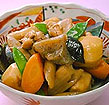

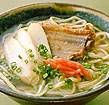

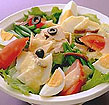


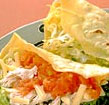
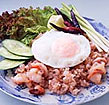

 3.
Related Cases
3.
Related Cases
- Halal: The
Islamic Regulations on the Import of Meat; Beef
- Indbeef: India's
beef and meat exports to rest of the world
- Japrice: Japan
Rice Trade
- Jpshrimp: Japan
and Shrimp
- Madcow: Mad
Cow Disease
- Orang: Indonesian
Orangutan Extinction
- Pig-Virus: Outbreak
of Japanese Encephalitis (Pig-Virus) in Malaysia
- Pork: Pork
Imports in Korea (PORK)
- Saudpork: Pork
Imports and Saudi Arabia
- Spice: Arab
Spice Trade and Spread of Islam
- Tilapia: Tilapia
and the Environment
The US fast food giant MacDonald's
had a similar case with some beef showing up in vegetarian French Fries.
Since early 1990s, the MacDonald's was
said to have used its tallow-flavored French fries like beef. In June
2002, the fast food giant was sued by the US-based group of vegetarians and
Hindus. Then, a judge has certified a $10 million settlement between McDonald's
Corp. and a group of plaintiff vegetarians and Hindus plaintiffs that requires
the restaurant chain to publicly apologize for falsely claiming its tallow-flavored
French fries had no meat products. The court approval means that McDonald's will pay the money to the class-action
litigants and offer both an apology and its food ingredients. The specific
distribution of the cash remains undecided by the court.
 4.
Author and Date
4.
Author and Date
Risa Ciccone (December, 2004)
 to
top
to
top
The Japanese
company Ajinomoto was forced to withdraw from the market a condiment that is
normally found in every household in Indonesia because the Indonesian Council
of Ulemas (Council of Religious Experts) ruled that it was Haram,
forbidden to Muslims, since the condiment concerned was made with an enzyme
obtained from pigs.
1)
What is defined as pork in Islam?
Islam began
approximately 1,400 years ago in Arabia. Its primary scriptures, called the
Koran, are revelation from God given to the Prophet Muhammad.
Dietary
laws for Muslims are very strict and clear. Muslims are forbidden from
consuming pork, alcohol, blood, meat dedicated to false gods, etc. When eating
meat, Muslims may only eat from meat that has been slaughtered in the name of
God, and meets stringent dietary requirements. Such meat is called pure, or
Haral . Islamic law prohibits a Muslim from eating pork, monkey, dog,
cat, any carnivores, and several other types of animal, as these animals are
Haram (forbidden).
In Indonesia,
almost all food products are described the mark of Haral in both English
and Arabic alphabet .
2)
What is Halal and Haram?
Halal
is an Arabic word meaning permitted or lawful. The opposite word of Halal
is Haram, that means prohibited or unlawful. The both words enable
to apply to all faces of Islamic life. The Koran has numerous injunctions, instructing
Muslims to choose and consume good and wholesome foodstuffs.
While many food products are clearly Halal or clearly Haram,
others are often referred to as Mashbooh, which means questionable. Foods considered
Haram are; (2)
Foods containing
ingredients such as gelatine, enzymes, emulsifiers, etc. are doubtful and questionable
(Mashbooh) because the origin of these ingredients is not clearly identified
with the symbol.
An MSG
plant got a harsh warning with possibility to be closed down since it changed
one ingredient in its production process, i.e. enzyme used in mollases fermenattion,
since it is produced from porcine in order to cut production cost. Thus, I believe
that the Ajinomoto is put not as Halal, but put as doubtful and questionable
(Mashbooh).
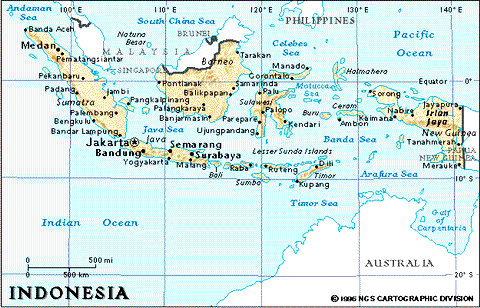
Official Name: Republic of Indonesia
Religions: Islam 87%, Protestant 6%, Catholic 3%, Other 3%
 5.
Discourse and Status:
5.
Discourse and Status:
Agreement
and Completed case
Japanese food seasoning giant Ajinomoto
apologized to Indonesia in several major newspapers over the use of pig enzymes
in its flavour enhancer product.
The apology comes even though President Abdurrahman Wahid had said scientific evidence showed Ajinomoto's MSG products were safe to be consumed by Muslims, and called on people not to overreact. He also had been reported as saying that PT Ajinomoto Indonesia's contentious seasoning product contained no substances extracted from pigs, and was therefore quite "halal", or appropriate for consumption by Muslims. (3) But the Indonesian Council of Ulemas (MUI), or Muslim religious leaders, remains steadfast in its view that the product should not be consumed by Muslims because a pork extract was used to cultivate the bacteria that produces the enzymes for MSG production.
 6.
Forum and Scope:
6.
Forum and Scope:
Forum:
Indonesia
Scope: Bilateral
 7.
Decision Breadth:
7.
Decision Breadth:
Two
Countries: Indonesia and Japan
 8.
Legal Standing:
8.
Legal Standing:
Law
(scripture,
called the Koran)
 to
top
to
top
 9.
Geographic Locations
9.
Geographic Locations
- Geographic
Domain: Asia
- Geographic
Site: South Asia
- Geographic
Impact: Indonesia
 10.
Sub-National Factors:
10.
Sub-National Factors:
No
 11.
Type of Habitat:
11.
Type of Habitat:
Tropical 

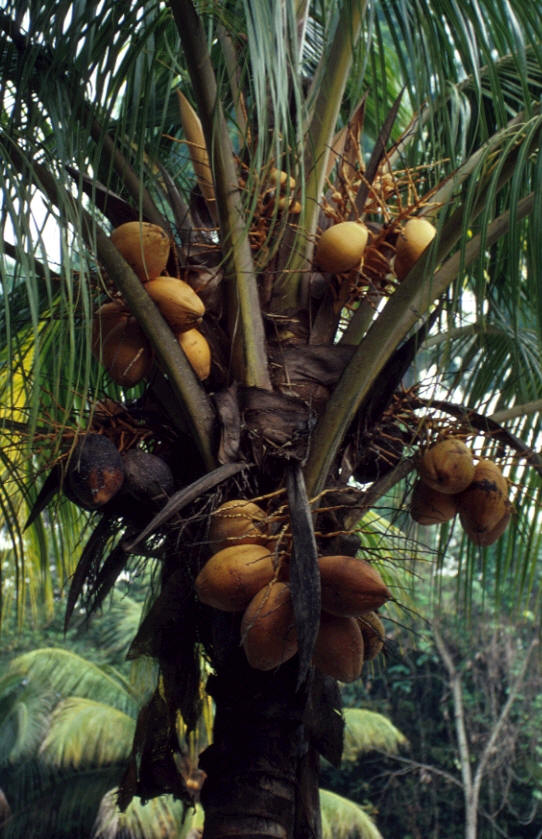
|
Indonesia lies between the mainland of South-East Asia and Australia in the Indian and Pacific oceans. It is the world’s largest archipelago state. Indonesia is made up of five main islands – Sumatra, Java, Sulawesi, Kalimantan, and Irian Jaya – and 30 smaller archipelagos. In total, the Indonesian archipelago consists of about 17,500 islands; 6000 of these are inhabited and stretch over 3000 miles, most lying in a volcanic belt with more than 300 volcanoes, the great majority of which are extinct. The landscape varies from island to island, ranging from high mountains and plateaux to coastal lowlands and alluvial belts. |
 |
 to
top
to
top
 12.
Type of Measure:
12.
Type of Measure:
Import Ban

 13.
Direct v. Indirect Impacts
13.
Direct v. Indirect Impacts
Direct
In Indonesia, imported food and drink products tend to deviate from Government Regulation No. 69/1999, especially as their number in the market place is increasing. An increasing number of imported products in the market, especially in modern supermarkets, do not have valid and proper labeling since the regulation on labeling came into effect. The main violation was that the products did not attach labels in Indonesian. If there is no action taken against this violation, it will lead to unhealthy rivalry and will complicate business and commercial Law.
Most food and beverage products violating the code are from China and Japan with the original language and writing which Indonesian consumers do not understand. However, based on the labeling regulation, all products sold in Indonesia should display the label in Indonesian.
A regulation on imported food products stipulates that importers should report details of the product, its certificate and product safety to the Directorate General of Food and Drug Supervision. After approval, the products can enter Indonesia and the Regional POM (Purchase Order Management) will supervise their marketing. It would be possible to smuggle in the products without reporting them to the Directorate General. However, its officials would immediately recognize the smuggled products because they would not have any kinds of ML code. The ML code applies to imported food products while the MD applies to domestic food products. The government would issue a directive on the regulation to encourage the importers to do better business.
It is expected that strict control of imported and domestic food and drink products will save society from deception, breach of religious law and health threats
 14.
Relation of Trade Measure to Environmental Impact
14.
Relation of Trade Measure to Environmental Impact
a. Directly Related to Product:
Yes, Spice
b. Indirectly Related to Product: Yes,
Pork
c. Not Related to Product: No
d. Related to Process: Yes, Culture
 15.
Trade Product Identification:
15.
Trade Product Identification:
Spice; AJINOMOTO
 16.
Economic Data:
16.
Economic Data:
1) History and Diverstification of Food Products in Indonesia
| Year |
|
| 1969 |
PT Ajinomoto Indonesia established. |
| 1970 |
PT Ajinomoto Indonesia, Mojokerto Factory commences operations. |
| 1970 |
AJINOMOTO ("umami" seasoning) launched.
|
| 1978 |
PT Janur Gading established. |
| 1986 |
AJI-PLUS (seasoning mix) launched. |
| 1987 |
PT Ajimex International established. |
| 1989 |
PT Ajimex International, Mojokerto Factory commences operations. |
| 1989 |
MASAKO (chiken and beef flavor sesoning mixes) launched. |
| 1993 |
PT Ajinomoto Sales Indonesia begins operations. |
| 1994 |
PT Ajinomoto Calpis Beverage Indonesia established. |
| 1995 |
CALPICO launched. |
| 1996 |
CALPICO SODA launched. |
| 1998 |
CALPICO WATER (bottle) launched. |
| 1999 |
SAJIKU (seasoning mixes) launched. |
| 2000 |
BIRDY COFFEE launched. |
|
 AJINOMOTO AJINOMOTO  AJI-PLUS AJI-PLUS
 Masako Masako
 Calpico
Soda Calpico
Soda  Caplico Water Caplico Water
 Sajuku
Sajuku
 Birdy
Coffee Birdy
Coffee
|
(source: "Business Outline of Ajinomo Group," Global Network, AJINOMOTO Co., Inc. )
2) The Damage
AJINOMOTO CO. INC. the Japanese seasoning giant suffered serious damage to its corporate image because of Ajinomoto Haram (Islamically forbidden) issue in 2001. The withdrawal of AJINOMOTO continued across the country, Indonesia. According to INDONESIA-NEWS, JKTP, 3,000 tons of the products are being recalled. It was also effecting the company’s other taste enhancers like MASAKO. At the same time, 20.4 tons of Ajinomoto and 1.8 tons of MASAKO had already been withdrawn from the market. The INDONESIA-NEWS, JKTP also says some 100 tons of AJINOMOTO were sent to North Sumatra. The Ajinomoto Co., Inc. had allocated some 5 million Rupiah for the recall including refunds. Some 60.2 tons of AJINOMOTO from central Sulawesi were also being shipped back to East Java the product’s factory is located. Most of AJINIMOTO were collected from provincial distributor PT Tompotila Raya and the rest from 234 shops and kiosks across Palu. (4)
3) No Damage?
However, the Ajinomoto Co., Inc. accounts for about one third of the global MSG market. The Indonesian sales were a minor segment. Its business performance is booming rather than experiencing rapid declines. The Nikkei Business provides the fact; (5)
Year |
Amout of Sales |
business profit |
| |
(unit; billion Yen) |
(unit; billion Yen) |
| 1999 |
76 |
62 |
| 2000 |
78 |
63.5 |
| 2001 |
80 |
66 |
| 2002 |
90 |
68.5 |
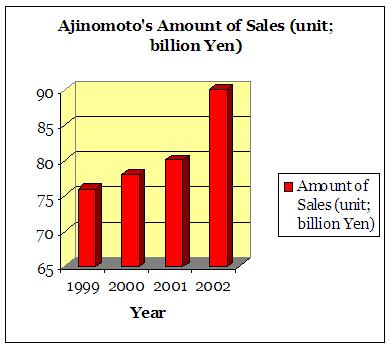
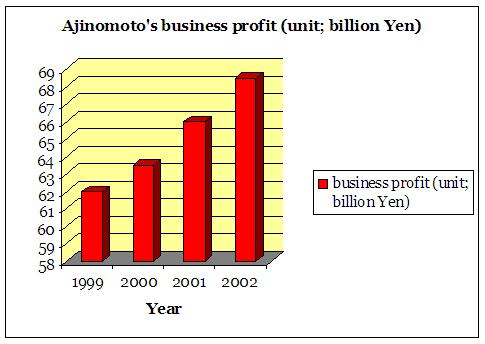
The data says that the Ajinomoto Co., Inc. has not left serious aftereffects on the Haral issue in 2001. Instead of the badly legacy of the case, the company’s sales have been growing. The President and Chief Executive Officer (CEO), Kunio Egashira mentions that we sometimes can see children in Indonesia shout “AJINOMOTO” as soon as they find out Japanese. That is, Ajinomoto is a sort of synonymous with “well-liked” Japanese. Though the Haral issue has led to a 10% decrease in sales of the “umami” seasoning in Indonesia, the Ajinomoto Co., Inc. are currently promoting, at the same time as the President said, “we (the Ajinomoto Co., Inc.) are reinforcing our capabilities to achieve and maintain a strong number one position in our markets.”
 17.
Impact of Trade Restriction:
17.
Impact of Trade Restriction:
High Impact
Japan is a major trading partner and investor in Indonesia.
 18.
Industry Sector:
18.
Industry Sector:
Food; Spice
 19.
Exporters and Importers
19.
Exporters and Importers
Japan and many Asian Countries
 to
top
to
top
 20.
Environmental Problem Type:
20.
Environmental Problem Type:
Culture
 21.
Name, Type, and Diversity of Species:
21.
Name, Type, and Diversity of Species:
NA
 22.
Resource Impact and Effect:
22.
Resource Impact and Effect:
Low and Technology
 23.
Urgency and Lifetime:
23.
Urgency and Lifetime:
Low and 5-10 years
 24.
Substitutes:
24.
Substitutes:
Not applicable
 to
top
to
top
VI.
Other Clusters
 25.
Culture:
25.
Culture:
Yes
 26.
Trans-Boundary Issues:
26.
Trans-Boundary Issues:
Yes
The Ajinomoto case has attracted nationwide attention in Japan, not only from major media organizations, but also from politicians and the business community. There also seems to be growing concern here that the case could trigger anti-Japanese sentiment, not only in Indonesia but also in other predominantly Islamic countries.
 27.
Rights:
27.
Rights:
Yes
See Legal Clusters.
 28.
Relevant Literature
28.
Relevant Literature
(1) Agriculture
and Agri-Food Canada , Halal Food Products Market Report , 2002 ,
January 1, [ http://atn-riae.agr.ca/africa/e3281.htm#2.2%20What%20is%20Halal?]
(2) AJINOMOTO JAPAN [http://www.ajinomoto.co.jp/]
(3) Asia Times, January 11, 2001 [http://www.atimes.com/se-asia/CA11Ae01.html]
(4) Gus Dur, "Ajinomoto Is 'Halal',"INDONESIA-NEWS, JKTP, January 09, 2001 [http://www.hamline.edu/apakabar/basisdata/2001/01/09/0035.html]
(5) The Nikkei Business , 2002, July 1, pp. 58-63. [http://nb.nikkeibp.co.jp/nb/nbshare/news_o/8.pdf]
 to
top
to
top
©Risa
Ciccone 12/15/04
Email me
Go to all cases





 Original
business location established in Kyobashi-ku, Tokyo (1909)
Original
business location established in Kyobashi-ku, Tokyo (1909) 



























